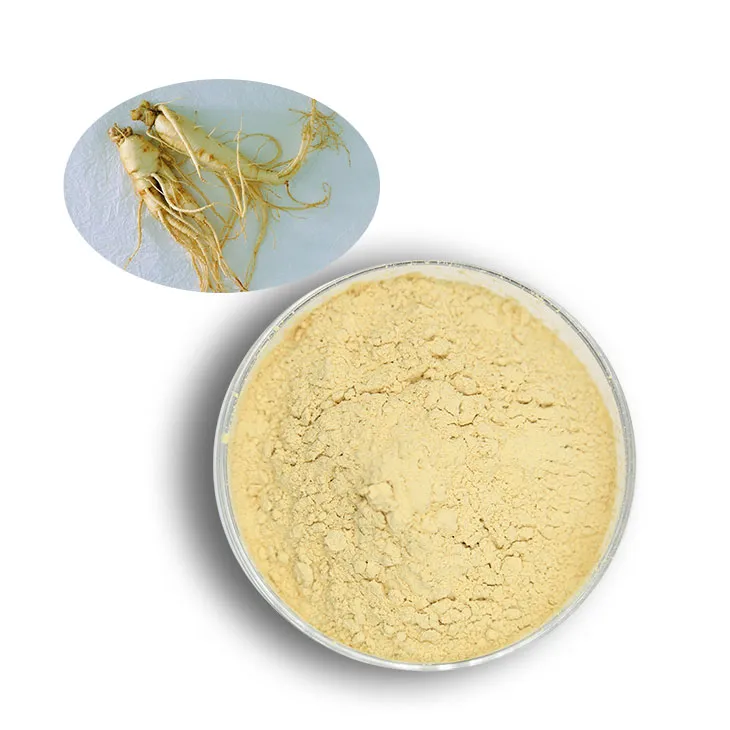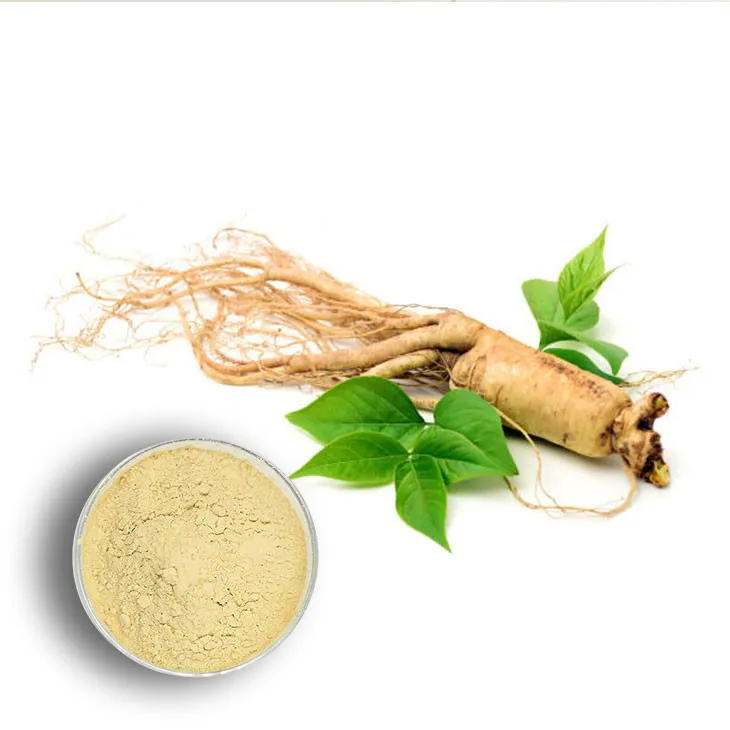- 0086-571-85302990
- sales@greenskybio.com
Does American ginseng root extract have benefits for diabetes? Are these all safe and applicable for diabetic patients?
2024-11-12

1. Introduction
Diabetes mellitus is a complex metabolic disorder that affects millions of people worldwide. The management of diabetes typically involves lifestyle modifications, such as diet and exercise, along with pharmacological interventions. However, the search for complementary and alternative therapies, including natural products, has been on the rise. American Ginseng Root Extract has emerged as a potential candidate in the realm of diabetes management. This article aims to comprehensively explore whether American Ginseng Root Extract offers benefits for diabetes and to assess its safety for diabetic patients.

2. What is American Ginseng Root Extract?
2.1 Botanical Origins
American ginseng (Panax quinquefolius) is a perennial herb native to North America. The root of this plant has been used in traditional medicine for various purposes. It contains a variety of bioactive compounds, such as ginsenosides, which are believed to be responsible for many of its potential health effects.2.2 Preparation of the Extract
The extract is typically obtained through a process that may involve drying and grinding the roots, followed by extraction using solvents like alcohol or water. This results in a concentrated form of the bioactive components present in the root.
3. Potential Benefits for Diabetes
3.1 Glucose Regulation
- Several studies have suggested that American Ginseng Root Extract may play a role in glucose regulation. It has been shown to affect the way the body processes glucose, potentially helping to lower blood sugar levels. For example, some research indicates that certain ginsenosides in the extract can enhance insulin sensitivity. Insulin sensitivity is crucial in diabetes, as it allows cells to more effectively take up glucose from the bloodstream in response to insulin.
- Animal studies have provided some evidence of its hypoglycemic effects. Mice or rats fed with American Ginseng Root Extract showed improved glucose tolerance compared to those not receiving the extract. This suggests that it may have a similar effect in humans, although further human clinical trials are needed for confirmation.
3.2 Anti - inflammatory Properties
- Chronic inflammation is often associated with diabetes. American Ginseng Root Extract has been found to possess anti - inflammatory properties. The bioactive compounds in the extract may help reduce inflammation in the body, which could potentially have a positive impact on diabetes management. By reducing inflammation, it may help to mitigate some of the complications associated with diabetes, such as cardiovascular problems.
- Studies have shown that the anti - inflammatory effects of American ginseng root extract may be mediated through various mechanisms, including the modulation of cytokine production. Cytokines are signaling molecules involved in the inflammatory response, and by regulating their levels, the extract may contribute to a more balanced inflammatory state.
3.3 Oxidative Stress Reduction
- Diabetes is also characterized by increased oxidative stress, which can lead to cellular damage. American ginseng root extract has antioxidant properties. It contains compounds that can scavenge free radicals, which are highly reactive molecules that contribute to oxidative stress. By reducing oxidative stress, the extract may help protect cells from damage, particularly in organs such as the pancreas, which is crucial for insulin production.
- Some research has demonstrated that American ginseng root extract can increase the activity of antioxidant enzymes in the body. These enzymes play a key role in neutralizing free radicals, further highlighting its potential role in reducing oxidative stress in diabetic patients.

4. Safety Considerations for Diabetic Patients
4.1 Interaction with Medications
- One of the primary safety concerns for diabetic patients considering American ginseng root extract is its potential interaction with medications. Diabetic medications, such as insulin and oral hypoglycemic agents, are carefully prescribed to manage blood sugar levels. American ginseng root extract may interact with these medications, potentially leading to hypoglycemia (low blood sugar). For example, if a patient is taking metformin and also starts taking American ginseng root extract without proper medical supervision, there is a risk of the blood sugar dropping too low.
- It is essential for diabetic patients to inform their healthcare providers if they are considering using American ginseng root extract, as the healthcare provider can monitor for any signs of interaction and adjust the medication regimen if necessary.
4.2 Quality and Purity
- The quality and purity of American ginseng root extract products on the market can vary widely. Some products may be contaminated with other substances or may not contain the labeled amount of active ingredients. Contaminated products could pose risks to diabetic patients, such as allergic reactions or other adverse effects. To ensure safety, it is advisable to choose products from reputable manufacturers that adhere to strict quality control standards.
- Testing the product for quality and purity through independent laboratories can also be a good practice. This can help diabetic patients have more confidence in the product they are using and reduce the risk of potential harm.
4.3 Individual Variability
- Just like with any supplement or treatment, individual variability plays a role in the response to American ginseng root extract. Some diabetic patients may tolerate the extract well and experience potential benefits, while others may be more sensitive and experience adverse effects. Factors such as age, overall health status, and genetic factors can influence how a patient responds to the extract.
- Therefore, it is important to start with a low dose when using American ginseng root extract and gradually increase the dose while closely monitoring for any signs of adverse reactions. If any negative symptoms occur, such as dizziness, nausea, or abnormal blood sugar fluctuations, the use of the extract should be discontinued immediately and medical advice sought.

5. Clinical Evidence
5.1 Human Trials
- A number of human clinical trials have been conducted to evaluate the effects of American ginseng root extract on diabetes. Some trials have reported positive results in terms of blood sugar control. For instance, in a short - term study, diabetic patients who took American ginseng root extract showed a modest reduction in fasting blood glucose levels compared to those on placebo.
- However, the results of these trials have not been entirely consistent. Some studies have failed to show significant benefits in terms of glycemic control. This could be due to differences in study design, such as the dose of the extract used, the duration of the study, and the characteristics of the study participants.
5.2 Meta - Analyses
- Meta - analyses, which combine the results of multiple studies, have also been carried out to assess the overall evidence regarding American ginseng root extract and diabetes. These meta - analyses have generally indicated that there may be a beneficial effect of the extract on blood glucose levels, but the magnitude of the effect may be relatively small. Additionally, more high - quality studies are needed to strengthen the evidence base.
- One limitation of meta - analyses in this area is the heterogeneity among the included studies. Different studies may use different extraction methods, doses, and populations, which can make it challenging to draw definitive conclusions.
6. Conclusion
American ginseng root extract shows potential benefits for diabetes in terms of glucose regulation, anti - inflammatory properties, and oxidative stress reduction. However, its safety for diabetic patients is a complex issue that requires careful consideration. The potential for interactions with medications, variability in product quality, and individual differences in response all highlight the need for caution. While some clinical evidence suggests a positive impact on blood sugar control, more research, particularly high - quality, large - scale human trials, is needed to fully understand the benefits and risks. Diabetic patients should always consult their healthcare providers before using American ginseng root extract to ensure that it is a safe and appropriate addition to their diabetes management plan.
FAQ:
Question 1: How does American ginseng root extract potentially benefit diabetes?
American ginseng root extract may help with diabetes in several ways. It might improve blood sugar control by enhancing insulin sensitivity. Some studies suggest that it can modulate the glucose - uptake mechanisms in cells, which can assist in regulating blood glucose levels. Additionally, it may have antioxidant properties that can reduce oxidative stress associated with diabetes, which in turn can protect the body's cells and organs from damage.
Question 2: Are there different forms of American ginseng root extract and do they all have the same effect on diabetes?
There are different forms of American ginseng root extract, such as capsules, powders, and tinctures. However, they may not all have the same effect on diabetes. The bioavailability and potency can vary depending on the extraction method and formulation. For example, some forms may be more concentrated and thus potentially more effective in influencing blood sugar levels, while others may have lower levels of the active compounds. Also, the way they are processed can affect how the body absorbs and utilizes the components relevant to diabetes management.
Question 3: What is the recommended dosage of American ginseng root extract for diabetic patients?
The recommended dosage of American ginseng root extract for diabetic patients can vary depending on factors such as the patient's overall health, the severity of their diabetes, and other medications they may be taking. Generally, it is advisable to start with a low dose and gradually increase it under the supervision of a healthcare provider. Some studies have used dosages in the range of 1 - 3 grams per day, but this should not be considered a universal standard without proper medical advice.
Question 4: Can American ginseng root extract interact with diabetes medications?
Yes, American ginseng root extract can interact with diabetes medications. It may potentiate the effects of hypoglycemic drugs, leading to an increased risk of low blood sugar (hypoglycemia). For example, if a diabetic patient is taking insulin or sulfonylureas and also consumes American ginseng root extract, the combined effect may cause blood sugar levels to drop too low. Therefore, it is crucial for diabetic patients to inform their healthcare providers if they plan to use American ginseng root extract to avoid potential adverse interactions.
Question 5: Are there any side effects of American ginseng root extract for diabetic patients?
There can be side effects of American ginseng root extract for diabetic patients. Some possible side effects include digestive issues like nausea, vomiting, and diarrhea. It may also cause insomnia, nervousness, or increased blood pressure in some individuals. Additionally, as mentioned before, there is a risk of hypoglycemia when it interacts with diabetes medications. These side effects may vary from person to person, and it is important to monitor for any adverse reactions when starting to use American ginseng root extract.
Related literature
- The Effects of American Ginseng on Glucose Homeostasis in Diabetes: A Systematic Review"
- "American Ginseng and Diabetes: Current Evidence and Future Directions"
- "Safety and Efficacy of American Ginseng Root Extract in Diabetic Patients: A Meta - Analysis"
- ▶ Hesperidin
- ▶ Citrus Bioflavonoids
- ▶ Plant Extract
- ▶ lycopene
- ▶ Diosmin
- ▶ Grape seed extract
- ▶ Sea buckthorn Juice Powder
- ▶ Fruit Juice Powder
- ▶ Hops Extract
- ▶ Artichoke Extract
- ▶ Mushroom extract
- ▶ Astaxanthin
- ▶ Green Tea Extract
- ▶ Curcumin
- ▶ Horse Chestnut Extract
- ▶ Other Product
- ▶ Boswellia Serrata Extract
- ▶ Resveratrol
- ▶ Marigold Extract
- ▶ Grape Leaf Extract
- ▶ New Product
- ▶ Aminolevulinic acid
- ▶ Cranberry Extract
- ▶ Red Yeast Rice
- ▶ Red Wine Extract
-
Dandelion Root Extract
2024-11-12
-
Quercetin
2024-11-12
-
Hericium erinaceus extract powder
2024-11-12
-
Tongkat Ali Extract
2024-11-12
-
Yam Extract
2024-11-12
-
Nettle Root Extract
2024-11-12
-
Tamarind extract powder
2024-11-12
-
Red Vine Extract
2024-11-12
-
Feverfew Extract
2024-11-12
-
Medicinal Marshmallow Extract
2024-11-12





















